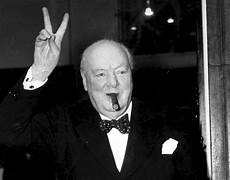Born in 1874, Winston Spencer Churchill came from a distinguished family (he was grandson of the Seventh Duke of Marlborough). According to his rather disparaging account of his lack of academic achievements at Harrow School, he did not distinguish himself and did not go university. Instead he joined the army aged 20. He saw action in various campaigns, culminating in the Second Boer War. He then served as war correspondent, thus becoming well known to the public at large.

He was elected to parliament as a Conservative in 1900, but he defected to the Liberals in 1904. During the First World War he was First Lord of the Admiralty. He was in charge of the disastrous Gallipoli campaign. In the aftermath he returned to the front, fighting with the Royal Scots Guards. After six months he returned to Government under David Lloyd George, serving first as Minister of Munitions.
After two years out of Parliament, he rejoined the Tory party and served as Chancellor of the Exchequer under Prime Minister Stanley Baldwin. Out of office during the 1930s, he produced the definitive biography of his ancestor, the First Duke of Marlborough. He spent much of 1932 working on the book, but after Hitler came to power in Germany he became increasingly concerned at the direction which that country was taking. Most politicians and many of the general public did not share this sense of foreboding. However as the situation developed it became obvious that Churchill had been right.
With the outbreak of war it was apparent that Neville Chamberlain had lost support in the country, and early in 1940 Churchill took over as Prime Minister. The broad sweep of his achievement during the Second World War are well known, and are covered in great detail in his own multi-volume account of the war. He was voted out of office by an apparently ungrateful nation in 1945, having successfully prosecuted the conflict almost to its conclusion. Despite his advancing years he had a further period as Prime Minster in the 1950s.
He died in the morning of the 24th of January, 1965. He was ninety years old. Chartwell was his country house in Kent, which he had bought in 1922. It was where he lived for almost the rest of his life. His last few months were spent at his London house, following a serious stroke in 1964. In the post-war period he was forced to abandon ownership of Chartwell, but the property was acquired by the National Trust, with Churchill being granted the lease which he retained until the end of his life. In the 1930s, when Churchill was out of political office, Chartwell became the centre of his world.
JOSEPH MASON
THE HISTORY BLOG